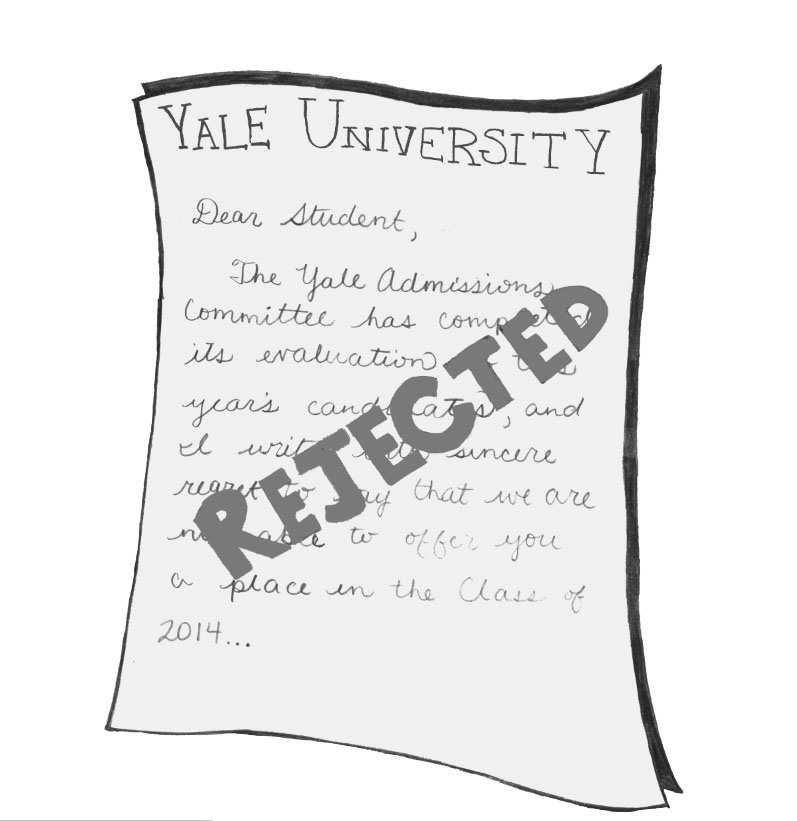I slowly opened my early decision college notification letter, hoping “Congratulations!” was the first word I would see. Instead I was hit in the face with, “I regret to inform you that we are unable to offer you admission…” Immediately, my heart sank, and I felt like bawling my eyes out. Why was I rejected? Was I not good enough?
But, surprisingly, I shed no tears. Even more surprising, in addition to feeling sad, I also felt sort of…relieved. Not only was I relieved from the stress of pre-notification anxiety, but I also knew that I could apply to other colleges that I had dreamed of attending. I was no longer bound to one specific college, which would be unfortunate if my priorities changed later on. Rejection, not just college rejection but rejection in general, has a bright side that many refuse to acknowledge but comes in handy when dealing with different types of rejection.
“The best thing about rejection is that it can help you get better,” Susan Walsh, PhD, of Psychology Today said. “Whether you’re learning how to polish your game or that you’re wonderful as you are, there’s always something we can take away from a rejection experience. But what you need to know in your bones is that you are not right for all markets and you’ll think you know what is best for you, but you’ll be wrong.”
Even though I was rejected, I was comforted by the fact that I had more options and that I had already been accepted to other colleges. That’s why it is important to “keep more than one iron in the fire” at a time. Getting rejected from one position is less devastating if you are accepted at the same time somewhere else.
Rejection also builds character. By stumbling into dead ends and coming out on the other side, one is able to more effectively deal with rejection later on and to accept failure as a natural part of life.
Here at school, rejection comes in many ways: not getting a leadership position, failing a test, being put down by a friend, or in senior Joseph Robillard’s case, not advancing to the finals round at the Harvard Speech and Debate tournament. Now a nationally ranked speaker in humorous interpretation, Robillard admits that tournaments don’t always turn out the way he wants them to, or rather should turn out.
“Forensics is so subjective—all of your results are based on what the judges think of you, and there’s also regional bias and personal preference,” Robillard said. “At the most recent tournament, my oratory which is ranked first in the country didn’t even advance to elimination rounds because the judge in the first round thought I was cheating. That was a big rejection for me because I was counting on that piece to get me to the Harvard final.”
However, instead of dwelling on his disappointment, he took a positive outlook on his situation.
“I have some friends who have already graduated, and they said, ‘you know, you have this other event that you broke in so you just need to take it for what it is, have fun, and keep going.’ So I just took their word for it, and looking back, I actually did better than I have ever done in that event,” Robillard said.
Remember that rejection is not a reflection of who you are or the way you present yourself. In his case, Robillard was turned down for a reason that had nothing to do with merit. He learned to embrace his failures and look at them as motivation to do better rather than as signs of more failures to come. He has been very successful in original oratory as a result of these failures, and his success is evident in his original oratory ranking as number one in the nation.
Among adults, job-related rejections are common and probably more stressful than the type of rejection we young adults face. But senior Drew Ferguson knows how frustrating it is to be rejected from a job because she has experienced it herself. This past summer, Ferguson became certified as a lifeguard, and she applied for a job at the Oviedo Aquatic Center.
“I really wanted to lifeguard this summer, so I applied for the job,” Ferguson said. “But I ended up not getting it because there were two other older, more experienced people who applied, and they ended up being chosen instead of me.”
After the long process of two interviews, several swimming and safety tests, and evident passion and interest in working, it was disheartening for Ferguson to find out she had been rejected. Even though that was the only job Ferguson applied for during the summer, she ended up finding another job.
“Even though I was sad, obviously it’s not the end of the world, and it’s not my last chance,” she said. “I know there’s only going to be another opportunity.”
It’s important to know ahead of time what the chances are of a particular effort being successful. Even if the odds are long, that’s not a reason to not try. Keeping the odds in mind makes all the rejections along the way more tolerable. At the end of the day, it all comes down to a maxim that Robillard follows: “You aren’t defined by your greatest success, but how you respond to your greatest failure.”
“I really believe this because it takes one thing to do well or be successful,” Robillard said, “but it takes an entirely different, larger, and stronger person to be able to pick yourself up off the ground and continue pushing forward.”





